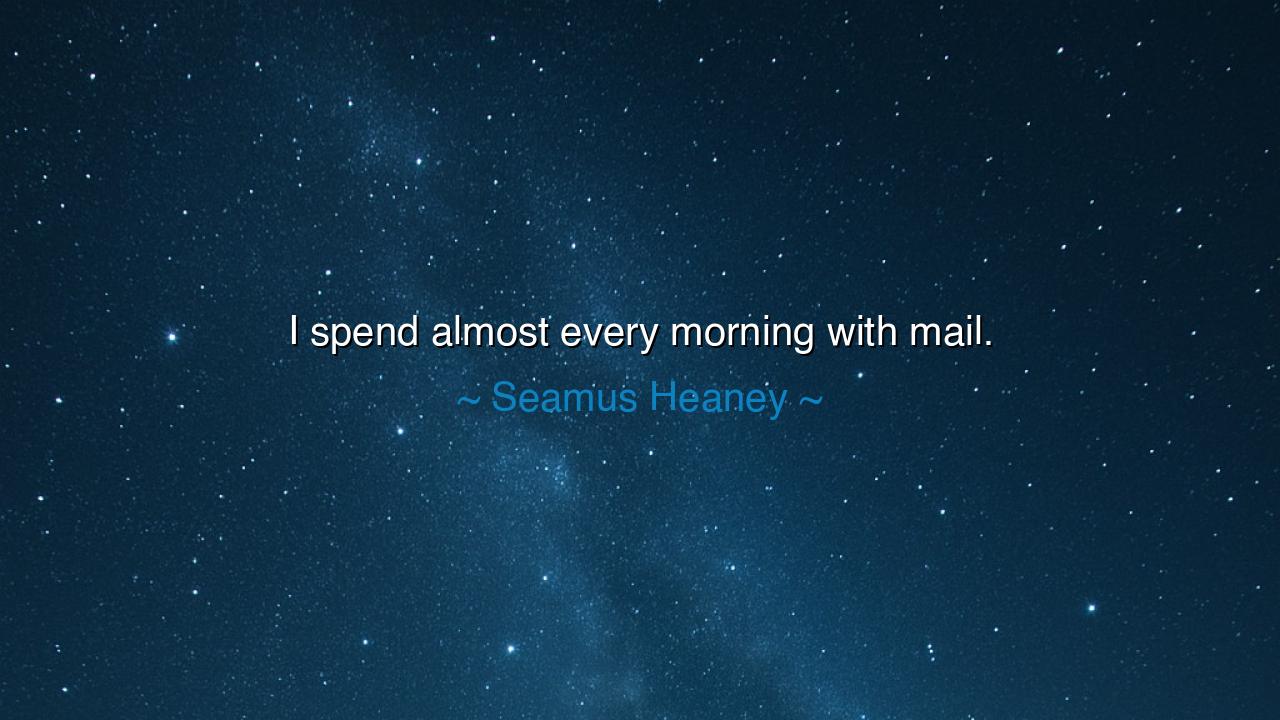
I spend almost every morning with mail.






When Seamus Heaney declared, “I spend almost every morning with mail,” he was not merely speaking of envelopes, letters, and messages. He was speaking of the eternal dialogue between the poet and the world, between the solitary soul and the countless voices that seek to reach it. The mail, in his words, is both literal and symbolic: the daily stream of correspondence, and the ceaseless tide of human connection, expectation, and demand. To sit with it each morning is to sit with the voices of others, to weigh their needs, their praises, their requests, and their sorrows.
For the poet, the morning is sacred. It is the hour when the mind is most open, the heart most attuned to silence, and the spirit most able to receive impressions. Yet Heaney reveals that this hour is not free of labor—it is given over to mail, the communion with others. Here lies the paradox of the artist: he is called to solitude to hear the whispers of eternity, yet he is bound by the cries of the world that seek his attention. The poet cannot escape the voices of men, nor should he, for his gift exists to serve them. Thus, each morning becomes a negotiation between the inward song and the outward call.
History too knows this burden. Consider Voltaire, who in his retreat at Ferney wrote thousands of letters, so many that his days were consumed by correspondence. Kings, philosophers, and common folk alike sent him their questions and appeals, and Voltaire, though weary, answered with diligence. His pen became as busy with mail as with his treatises, for he knew that to ignore the voices of the people was to deny the very mission of a thinker. Like Heaney, he gave his mornings to the dialogue, understanding that a writer’s greatness is measured not only by what he creates in solitude, but by how he responds to the world’s call.
There is also a deeper truth: mail is a symbol of life’s unending responsibilities. Each morning brings us our “letters”—tasks, obligations, voices waiting to be heard. Some are trivial, others urgent, yet all must be faced. Heaney reminds us that greatness is not born from isolation alone, but from the balance of inner creation and outer duty. To spend one’s morning with mail is to acknowledge the world before turning to the sacred labor of the self. It is an act of humility, of service, and of patience.
And yet, there is wisdom here for all. Too often, men and women despise their “mail”—their burdens, their inboxes, their daily obligations—as if these were interruptions to life. But in truth, they are life itself. Each message is a thread of connection, a reminder that we do not walk alone. Just as Heaney, the Nobel laureate, bent his mornings to the reading of letters, so too must we see in our daily correspondence an opportunity for compassion, attentiveness, and care. For in answering the call of others, we refine the soul, and in listening, we grow in wisdom.
The lesson is clear: attend faithfully to the voices entrusted to you. Do not scorn the small tasks, nor dismiss the letters and calls of others as mere interruptions. Instead, approach them with reverence, for they are the ties that bind you to the human family. But also, guard your balance. As Heaney gave his mornings to mail but not his whole day, so must you give attention without surrendering all of yourself. There must remain a space for your own song, your own labor, your own silence.
Thus, Heaney’s simple statement becomes a parable. It tells us that even the greatest of poets must sit humbly with the daily business of life, opening envelopes, attending to words not his own. And yet in this practice lies wisdom: that the path of greatness is not to flee from responsibility, but to weave it gently into the fabric of creation. So too should we, each morning, take up our own “mail”—whether literal letters, duties, or cares—and approach them not as burdens, but as sacred encounters with the voices of the world.






AAdministratorAdministrator
Welcome, honored guests. Please leave a comment, we will respond soon